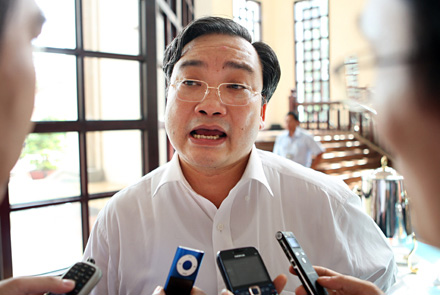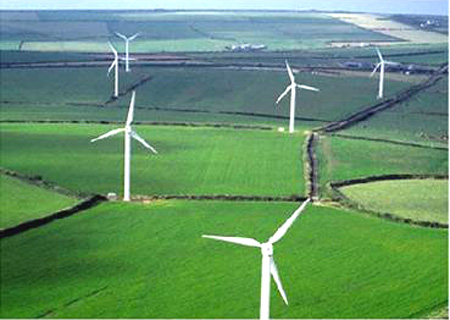No alternatives for nuclear power by 2050: Deputy PM
 |
| Deputy PM Hoang Trung Hai |
Vietnam continues to develop new energy sources as an alternative for nuclear power, but, according to the Vietnamese electricity development strategy, by 2050, the country will be unable to find a sufficient a source, the deputy PM said in an interview at the ongoing 13th National Assembly.
The government has issued a mechanism to support wind power development and also instructed ministries and agencies to study power production based on solar and wave power, Hai added.
He noted that, “We have discussed measures, such as importing electricity, the further development of hydropower plants to meet the domestic power demand; however, all of these are face certain difficulties. Therefore, finding a potential alternative primary source can help ease the country’s reliance on nuclear power,” Hai added.
 |
| Wind power production is being piloted in Quy Nhon Province |
According to the deputy PM, to ease the power shortage, one of the most effective measures is using power-saving techniques.
“Everyone should start thinking about ways to reduce their power usage through practical, everyday means," Hai said.
Veitnam is still studying the feasibility of a nuclear power plant, and this type of power will not be implemented until the study proves it safe. The incident at Japan'sFukushima nuclear plant in March underlines this need.
Organisations involved in nuclear power worldwide are looking into how to safely generate power. Currently, around 400-500 nuclear power plants are in operation globally. The issue of nuclear power is a global concern, Hai said.
Vietnam plans to build its first nuclear power plants in the central province of Ninh Thuan with an annual capacity of 4,000 MW. The construction of Ninh Thuan Nuclear Power Plant 1 is scheduled to start in 2014 and it is expected to be operational by 2020.
What the stars mean:
★ Poor ★ ★ Promising ★★★ Good ★★★★ Very good ★★★★★ Exceptional
Related Contents
Latest News
More News
- Site clearance work launched for Dung Quat refinery upgrade (February 04, 2026 | 18:06)
- Masan High-Tech Materials reports profit: a view from Nui Phao mine (February 04, 2026 | 16:13)
- Hermes joins Long Thanh cargo terminal development (February 04, 2026 | 15:59)
- SCG enhances production and distribution in Vietnam (February 04, 2026 | 08:00)
- UNIVACCO strengthens Asia expansion with Vietnam facility (February 03, 2026 | 08:00)
- Cai Mep Ha Port project wins approval with $1.95bn investment (February 02, 2026 | 16:17)
- Repositioning Vietnam in Asia’s manufacturing race (February 02, 2026 | 16:00)
- Manufacturing growth remains solid in early 2026 (February 02, 2026 | 15:28)
- Navigating venture capital trends across the continent (February 02, 2026 | 14:00)
- Motivations to achieve high growth (February 02, 2026 | 11:00)

 Tag:
Tag:




















 Mobile Version
Mobile Version